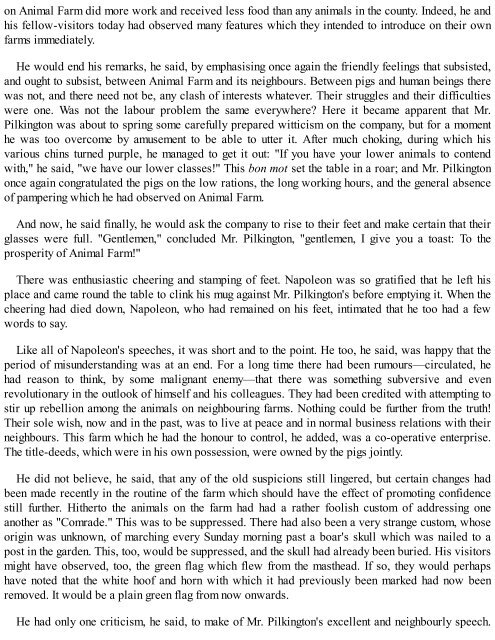You also want an ePaper? Increase the reach of your titles
YUMPU automatically turns print PDFs into web optimized ePapers that Google loves.
on Animal Farm did more work and received less food than any animals in the county. Indeed, he and<br />
his fellow-visitors today had observed many features which they intended to introduce on their own<br />
farms immediately.<br />
He would end his remarks, he said, by emphasising once again the friendly feelings that subsisted,<br />
and ought to subsist, between Animal Farm and its neighbours. Between pigs and human beings there<br />
was not, and there need not be, any clash of interests whatever. Their struggles and their difficulties<br />
were one. Was not the labour problem the same everywhere? Here it became apparent that Mr.<br />
Pilkington was about to spring some carefully prepared witticism on the company, but for a moment<br />
he was too overcome by amusement to be able to utter it. After much choking, during which his<br />
various chins turned purple, he managed to get it out: "If you have your lower animals to contend<br />
with," he said, "we have our lower classes!" This bon mot set the table in a roar; and Mr. Pilkington<br />
once again congratulated the pigs on the low rations, the long working hours, and the general absence<br />
of pampering which he had observed on Animal Farm.<br />
And now, he said finally, he would ask the company to rise to their feet and make certain that their<br />
glasses were full. "Gentlemen," concluded Mr. Pilkington, "gentlemen, I give you a toast: To the<br />
prosperity of Animal Farm!"<br />
There was enthusiastic cheering and stamping of feet. Napoleon was so gratified that he left his<br />
place and came round the table to clink his mug against Mr. Pilkington's before emptying it. When the<br />
cheering had died down, Napoleon, who had remained on his feet, intimated that he too had a few<br />
words to say.<br />
Like all of Napoleon's speeches, it was short and to the point. He too, he said, was happy that the<br />
period of misunderstanding was at an end. For a long time there had been rumours—circulated, he<br />
had reason to think, by some malignant enemy—that there was something subversive and even<br />
revolutionary in the outlook of himself and his colleagues. They had been credited with attempting to<br />
stir up rebellion among the animals on neighbouring farms. Nothing could be further from the truth!<br />
Their sole wish, now and in the past, was to live at peace and in normal business relations with their<br />
neighbours. This farm which he had the honour to control, he added, was a co-operative enterprise.<br />
The title-deeds, which were in his own possession, were owned by the pigs jointly.<br />
He did not believe, he said, that any of the old suspicions still lingered, but certain changes had<br />
been made recently in the routine of the farm which should have the effect of promoting confidence<br />
still further. Hitherto the animals on the farm had had a rather foolish custom of addressing one<br />
another as "Comrade." This was to be suppressed. There had also been a very strange custom, whose<br />
origin was unknown, of marching every Sunday morning past a boar's skull which was nailed to a<br />
post in the garden. This, too, would be suppressed, and the skull had already been buried. His visitors<br />
might have observed, too, the green flag which flew from the masthead. If so, they would perhaps<br />
have noted that the white hoof and horn with which it had previously been marked had now been<br />
removed. It would be a plain green flag from now onwards.<br />
He had only one criticism, he said, to make of Mr. Pilkington's excellent and neighbourly speech.









![Genki - An Integrated Course in Elementary Japanese II [Second Edition] (2011), WITH PDF BOOKMARKS!](https://img.yumpu.com/58322134/1/180x260/genki-an-integrated-course-in-elementary-japanese-ii-second-edition-2011-with-pdf-bookmarks.jpg?quality=85)
![Genki - An Integrated Course in Elementary Japanese I [Second Edition] (2011), WITH PDF BOOKMARKS!](https://img.yumpu.com/58322120/1/182x260/genki-an-integrated-course-in-elementary-japanese-i-second-edition-2011-with-pdf-bookmarks.jpg?quality=85)





